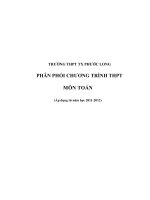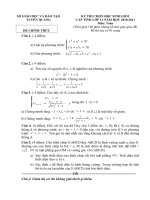CHTN TA 12 nam 2011 2012
Bạn đang xem bản rút gọn của tài liệu. Xem và tải ngay bản đầy đủ của tài liệu tại đây (66.13 KB, 4 trang )
<span class='text_page_counter'>(1)</span><div class='page_container' data-page=1>
<b>T4</b>
1What does WHO stand for
A. WHO stands for World Health Organization
B. WHO stands for World Health
C. WHO stands for Health Organization
2. When was WHO established?
A. It was established on 7 April 1950
B. It was established on 7 April 1949
C. It was established on 7 April 1948
3. What is WHO’s major objectives?
A. Its major objective is the attainment by all peoples of the lowest possible
level of health
B. Its major objective is the attainment by all peoples of the smallest
possible level of health
C. Its major objective is the attainment by all peoples of the highest possible
level of health
4. What are WHO’s main activities?
A. Its major activities are carrying out research on medical development
B. Its major activities are carrying out research on improving international
health care
C. Its major activities are carrying out research on medical development and
improving international health care
5. What is the Red Cross Fedration’s mission?
A. The fedration’s mission is to improve the life of vulerable people
B. The fedration’s mission is to improve the life of poor people
C. The fedration’s mission is to improve the life of dis advataged people
6. ………. countries in the world have national Red Cross societies
A. 185 B. 186 C. 187
7. What are advantages of having Red Cross societies?
A. People in the countries can get quickly help and supports when they are
in difficulty
B. People in the countries can get help and supports when they are in extict
C. People in the countries can get help and supports when they are in danger
8. When was the UN established?
A. in 1954 B. in 1459 C. in 1594
9. How many main goals were set by the UN?
A. 2 B. 3 C. 4
10. The symbol of the Red Cross has …….. colours
A. 1 B. 2 C. 3
</div>
<span class='text_page_counter'>(2)</span><div class='page_container' data-page=2>
A. at B. in C. on
12. You can look …….the words in your dictionary
A. up B. in C. on
13. It’s dark here. Can you turn …… the light?
A. on B. in C. around
14. John put……….his best for the interview.
A. up B. off C. on
15. “Please come in and sit ………”
A. up B. upon C. down
16., Hurry……..! The bus is coming.
A. off B. up C. on
17. What was the main roles traditionally accorded to women?
A. working in education
B. building houses
C. taking care of the house and family
18. What percentage of all world jobs do women hold?
A. 40% B. 50% C. 60%
19. What do women earn for doing their domestic work?
A. they earn a lot of things for doing their domestic work
B. they earn nothing for doing their domestic work
C. they earn a little for doing their domestic work
20. How much food do women in developing countries produce?
A. they produce less than half of the food
B. they produce more than a quarter of the food
C. they produce more than half of the food
21. How much farm work do African women do?
A. 70% B. 80% C. 90%
22.A typical day for an African village women begin at……….
A. at 4.45 am B. at 5. 45 am C. at 6.45 am
23………. Is the amount of time a typical women spends on cooking
everyday.
A. 1 hour B. 2 hours C. 3 hours
24. In African ,………. Of farm work is done by men
A. 20% B. 40% C. 60%
<i><b>Answer: 1- A, 2- C, 3- C, 4- C, 5- A, 6- B, 7- A, 8- C, 9- C, 10- C, 11- B,</b></i>
<i><b>12-A, 13- A, 14- C, 15- C, 16- B, 17- C, 18- A, 19- B, 20- C, 21- B, 22- A,</b></i>
<i><b>23 –B, 234- A</b></i>
<b>T 5</b>
</div>
<span class='text_page_counter'>(3)</span><div class='page_container' data-page=3>
B. nearly two-thirds
C. nearly three –fourths
2. The everage women earns……….the everage man
A. more than B. the same as C. less than
3. A typical women endeveloping country spends ……….collecting
firewood daily.
A. 1 hour B. 2 hours C. 3 hours
4. You’re always asking me ……money. Ask somebody else for a change
A. about B. for C. to
5. I don’t want to talk……….what happen lastnight. Let’s forget it.
A. for B. to C. about
6. We waited ……….Jim for halp an hour but he never came.
A. for B. at C. in
7. I’ve applied …………a job at the factory. I don’t know if I’ ll get it.
A. in B. for C. at
7. I glanced ………my watch to see what the time was.
A. in B. on C. at
8. What does ASEAN stand for?
A. The association of southeast asian nations
B. The association of east asian nations
C. The association of south asian nations
9. When did vietnam join ASEAN?
A. 1993 B. 1994 C. 1995
10. The ASEAN region has a total area of………….sp.kilometres
A. 575.5 B. 4.4.464.322 C. 1282
11. Which countries founded ASEAN?
A.3 B. 4 C. 5
12. How many main goals of ASEAN?
A. 2 v B. 3 C. 4
13. The total trade value of ASEAN in 2006 was……..
A. US 1045billion dollar B. US1405 billion dolar C. US 1540 billion
dollar
14. The Hanoi Plan of Action was adopted
A. in 1998 v B. in 1999 C. in 2000
15. How many religions are there in Malaysia?
A. 1 B. 2 C. 3
16.Muslims mostly live in………….
A. the philippines
</div>
<span class='text_page_counter'>(4)</span><div class='page_container' data-page=4>
17. The main religion in Vietnam is……….
A. Buddhism B. Islam C. Catholicism
18. The ASEAN countries include ………..
A. about a quarter of a billion Muslims
B. 25 million muslims
C. half a billion Muslims
19. Nga has to summit the essay to her teacher
A. tomorrow night B. tomorrow (the next day) C. in 5 days
20. What country has the largest number of english speakers
A. The UK B. France C. The US
21. How many people speak emglish in the ASEAN region?
A. Around 50 million B. Around 60 million C. Around 70 million
22. In what country in the region is english mostly spoken?
A.In the malaysia B. In singapore C. In the Philippines
23. How many main regions exist in the ESAEN countries?
A. 3 B. 4 C. 5
24. When he ………..he ‘ll tell us about the match
A. arrived B. has arrives C. arrives
</div>
<!--links-->




